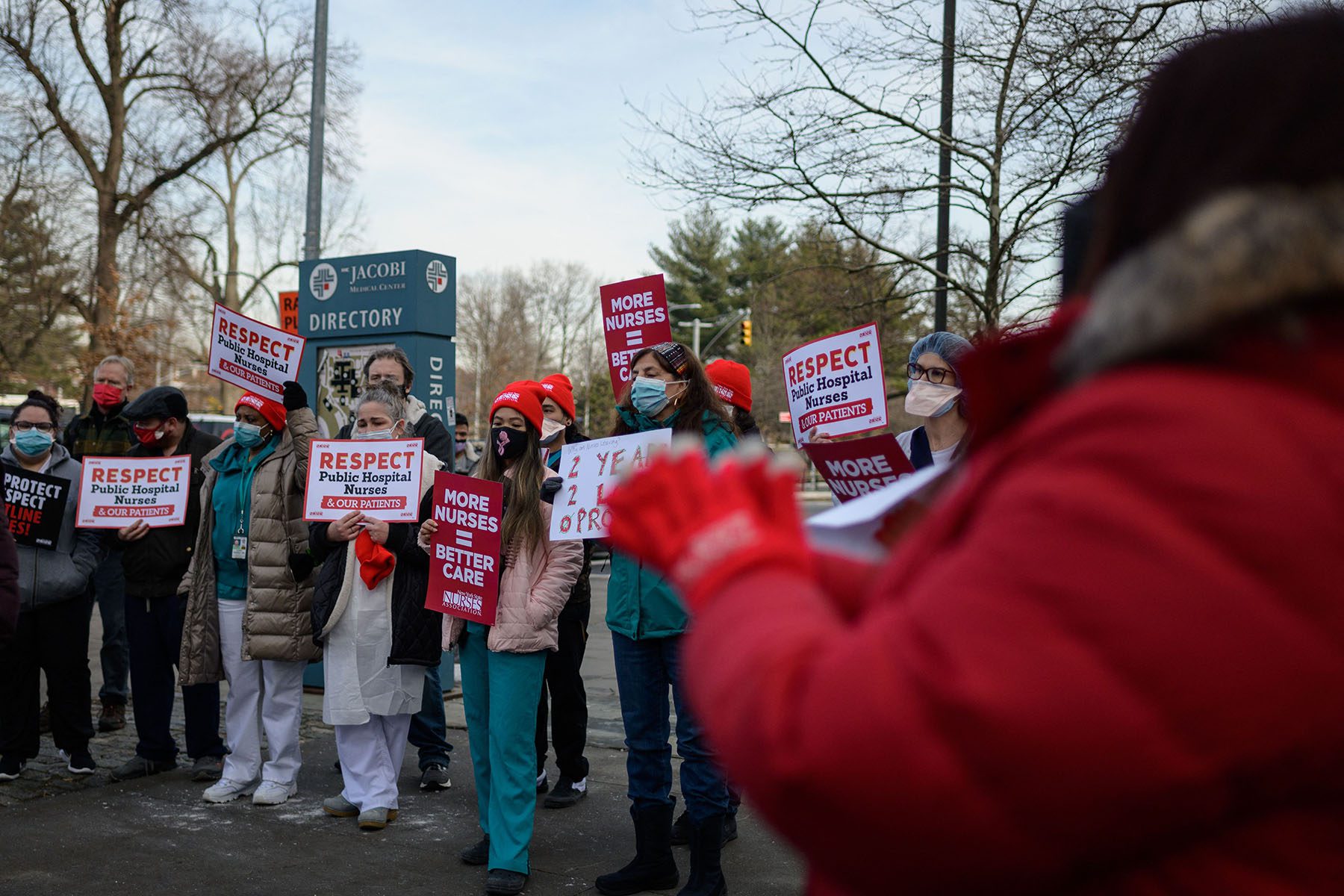
This Legislation Could Cap Travel Nurse Pay, Staffing Agencies Accused of "Price Gouging"
State and federal moves.
- What the Legislation Says
What Nurses Think

Updated 2/3/2022
It’s no secret that there has been a disparity in agency nurse and staff nurse wages over the past year and a half. And the disparity is becoming increasingly bigger as the weeks pass by. Travel nurse pay has never been higher since the pandemic started, with August numbers showing a weekly average rate of over $2.5K, compared to a December 2019 average weekly pay of just over $1K. And as staffing issues continue to plague the entire country, they show no signs of slowing down.
However, in an attempt to stop the ballooning wages—and perhaps better balance the gap between staff and travel nurse pay—some states have introduced legislation to cap agency nurse pay. As you can imagine, the idea has a lot of people talking, so here’s more on what the legislation is proposing, and how nurses are responding.
During the pandemic, there have been both state and federal moves towards enacting legislation specifically aimed towards more regulation for staffing agencies and limiting travel nurse pay rates. Most recently, the American Health Care Association/National Center for Assisted Living, LeadingAge and a coalition of long-term care and senior living organizations sent a letter to White House officials warning against the “price gouging” happening in staffing agencies and how the practice is harmful to both patients and providers, who receive fixed reimbursement primarily through Medicare and Medicaid.
That letter was followed by another one , signed by 200 supporters, urging Congress to enlist federal agencies with competition and consumer protection authority to investigate the conduct of nurse staffing agencies to determine if it is the product of anticompetitive activity and/or violates consumer protection laws. The letter cited that nursing staffing agencies are sometimes taking as much as 40% of the fee collected from hospitals, adding that continuing to pay the high fees to staffing agencies is “ simply unsustainable.”
Supporters behind the movement to cap travel nurses’ pay say that the pandemic has thrust the need for more requirements for staffing agencies into a major spotlight and that ignoring the financial and regulatory issues brought on could lead to long-term impacts.
Nationally, the American Health Care Association (AHCA) sent a letter to the Federal Trade Commission (FTC), urging the FTC to use its authority to protect consumers from anti-competitive and unfair practices regarding agency staffing. Statewide, Massachusetts and Minnesota are the only two states to already have agency wage caps in place, but some states did make initial moves to address high wages during the pandemic. (Although, notably, Massachusetts raised its caps by 35% for the amount agency staff for nursing homes could be paid during the pandemic.) In Minnesota, wages were also raised , but only slightly: agency RNs can make a max of $58.08/hour at regular pay and up to $99.90/hour for holiday pay.
Other states have tried to make some kind of moves towards regulating staffing agencies. For instance, with the advent of the pandemic, Connecticut prohibited profiteering during emergencies, with violators subject to fines by the state Department of Consumer Protection and the Office of the Attorney General. The New York State Health Care Facilities Association has also tried to introduce legislation but has not been successful yet. So far, Pennsylvania is the only state that appears to have the most concrete plan in place for moving forward with legislation specifically aimed at regulating staffing agencies.
What the Legislation Says
Although the legislation in Pennsylvania hasn’t been formally introduced yet, Pennsylvania Representative Timothy R. Bonner wrote a memorandum on November 5, 2021, that he plans to introduce Pennsylvania Health Care Association (PHCA)-supported legislation that will “require Contract Health Care Service Agencies who provide temporary employment in nursing homes, assisted living residences and personal care homes to register with the Department of Human Services (DHS) as a condition of their operations in Pennsylvania.”
As part of the requirements, the proposed legislation would establish maximum rates on agency health care personnel. Bonner noted that nursing homes in Pennsylvania lost 18% of their workforce, with 68% of the state’s facilities struggling to meet minimum staffing requirements. As a result—like many other healthcare facilities in the nation—agency staff filled those needs. However, in his memo, Bonner cited a statistic that 39% of the surveyed facilities said that they would not be able to afford to keep their facilities open for more than one year.
Part of that, he added, was the added cost of paying staffing agencies. In some cases, wages have ballooned to over 400% above the median wage rate for long-term care facility staff. Additionally, some of the facilities themselves have lost their own staff to travel agencies. And because long-term care facilities are funded primarily through Medicare (70% of all care in the state’s facilities are through the Medicare program), paying high agency staff wages has significantly drained Medicare funds as well.
Although the legislation would incorporate a cap on agency pay, it also aims to allow state agencies oversight of supplemental health care service agencies, which they currently do not have. That would include everything from registration requirements to an established system for reporting and penalties.
“Recognizing the increased role that these agencies play in the day-to-day operations of nearly 700 nursing homes and 1200 assisted living residences and personal care homes, we must ensure they are operating in a manner that supports the long-term care sector and high-quality resident care,” Bonner wrote.
As you can imagine, travel nurses have something to say about this legislation. In a travel nursing group on Facebook , over 270 comments poured in during a discussion on travel nurse wage caps.
Some nurses hinted that they would strike if legislation capping pay came to pass, while others warned that there would be no need for a formal strike--travel nurses could simply not pick up new assignments, making staffing shortages even worse.
“I have just had my best year ever. I could easily sit out for 6 months or change careers,” wrote one nurse. “They do not want to screw around with nurses right now. It is curious that people making legal policy don't possess the professional credentials to do our jobs but believe that they know better than us anyway,” this nurse added.
Other nurses pointed out that a wage cap could potentially put both patients and healthcare facilities at risk amidst another COVID-19 surge or even another health emergency. “If they try to cap RN pay, what will happen if there’s another COVID surge,” commented another nurse. “Let’s say they cap our rate at 5K, if there’s another surge they will most likely not get much RN’s wanting to help. So they better tread lightly otherwise they will have bigger problems in their hands. A severe nursing shortage.”
Another commenter chimed in to agree with Celne: “Right?” wrote a nurse. “If they cap, why would anyone want to go help with surges. I’m not going into a hot mess doing more work when I can stay capped right where I am for less work.”
There is also a Change.org petition circulating online as a result of the letter to Congress that aims to stop the efforts to cap travel nurses pay. “We all know that wage caps are going to have a detrimental effect on staffing, forcing even more nurses to give up working at the bedside and further worsening the problem at hand,” the petition reads. “What about encouraging legislation to protect the safety and rights of nurses? What about legislation to nationalize safe nurse-to-patient ratios? What about legislation to set a fair, competitive minimum pay for nursing? Reach out to your elected officials and voice your concerns. There are many solutions out there, but this isn't one of them.”
It’s left to be determined exactly if the legislation will pass and what the possible ramifications could be for both the travel nursing industry as well as the ongoing nursing shortage.

Chaunie Brusie , BSN, RN is a nurse-turned-writer with experience in critical care, long-term care, and labor and delivery. Her work has appeared everywhere from Glamor to The New York Times to The Washington Post. Chaunie lives with her husband and five kids in the middle of a hay field in Michigan and you can find more of her work here .

Plus, get exclusive access to discounts for nurses, stay informed on the latest nurse news, and learn how to take the next steps in your career.
By clicking “Join Now”, you agree to receive email newsletters and special offers from Nurse.org. We will not sell or distribute your email address to any third party, and you may unsubscribe at any time by using the unsubscribe link, found at the bottom of every email.
- Skip to main content
- Keyboard shortcuts for audio player
Health Care
Hospitals ask biden administration to help lower the soaring cost of travel nurses.
Shalina Chatlani
It's now been a year since the American Hospital Association alleged price gouging and asked the White House to investigate and act. Bidding wars among states have only escalated.
ARI SHAPIRO, HOST:
The American Hospital Association says health care staffing agencies are exploiting the pandemic, forcing them to pay astronomical wages for temporary nurses and other staff. Nurses who sign on with the agencies and who are willing to travel can more than double their salaries. That's because of the large sums of federal COVID relief money given to states. Shalina Chatlani, with the Gulf States Newsroom, reports hospitals are asking the White House to do something.
SHALINA CHATLANI, BYLINE: Last year, Kimberly Carson got tired of the nursing job she'd had for eight years at a hospital in Illinois. She didn't think she was being paid well enough to compensate for the pandemic workload.
KIMBERLY CARSON: I feel like you should be able to afford to pay your staff more money and better wages.
CHATLANI: Carson says, by the time the hospital started offering bonuses, it was too late.
CARSON: Like, where were you at, at the beginning when we really needed you? Where were you?
CHATLANI: So she quit and since December has worked as a traveling nurse, making twice her old salary on a temporary contract with a Mississippi hospital.
Demand for travel nurses has soared. Before the pandemic, hospitals sought to hire about 7,000 traveling nurses at any one time. By 2021, they were looking for 28,000. That's in part because of COVID relief money Congress sent states. Most are using it to hire travel nurses. Texas alone has spent $7 billion on temporary medical staff.
ROBYN BEGLEY: It's just not sustainable.
CHATLANI: Robyn Begley is with the American Hospital Association.
BEGLEY: Some hospitals that really struggle to break even at - year after year, we are really in a crisis.
CHATLANI: Nurse wages have also gone up because there are now far fewer nurses than before the pandemic. The 100,000 open positions then has now doubled.
BEGLEY: Some nurse staffing agencies, we believe, are exploiting the severe workforce shortages and charging exorbitant fees.
CHATLANI: Toby Malara of the American Staffing Association, a trade group, says staffing companies are just responding to the current labor market.
TOBY MALARA: And their prices are being driven by the wages and the cost of labor that have come about by the pandemic.
CHATLANI: He says some hospitals and governments are actually making things worse by not being good stewards of COVID relief money.
MALARA: If the federal money is used to pay and retain nurses and pay them bonuses, that could be helpful. But also, it gives them a chance to push out money and pay those higher rates without thinking about it as much.
CHATLANI: Some states, like Massachusetts, are trying to create rate caps, but Malara says that could drive nurses away. Better, he says, would be increasing nurse numbers overall and Medicaid payments to hospitals.
MALARA: Increase federal funding for nursing schools. You have to increase the Medicaid reimbursements.
CHATLANI: The hospital association asked the Federal Trade Commission to investigate staffing agencies a year ago. The FTC won't confirm whether it's doing so. The association has sent multiple letters to the White House, too.
A Biden administration official declined to speak publicly about a complaint to the FTC, an independent agency, but said that the White House has deployed federal search teams, and it's helped cover costs for National Guard deployments to hospitals with staffing shortages. It's also trying to accelerate visa processing for 5,000 foreign health care workers.
JAMIE HEARD: It all boils down to, I'm doing this for my family. It boils down to money.
CHATLANI: Jamie Heard, an ICU manager in Mississippi, says for now, nurses know the labor market has changed, and there's a lot less incentive to stay at a given hospital.
HEARD: I can bounce within my career and make more money. Staying long at places is, I think, a thing of the past.
CHATLANI: Last week, nearly 200 members of Congress signed on to a letter to the White House, urging quick action to rein in high travel nurse costs.
For NPR News, I'm Shalina Chatlani in Jackson, Miss.
(SOUNDBITE OF TWO PEOPLE SONG, "I'M TIED, TO YOU")
Copyright © 2022 NPR. All rights reserved. Visit our website terms of use and permissions pages at www.npr.org for further information.
NPR transcripts are created on a rush deadline by an NPR contractor. This text may not be in its final form and may be updated or revised in the future. Accuracy and availability may vary. The authoritative record of NPR’s programming is the audio record.
- Today's news
- Reviews and deals
- Climate change
- 2024 election
- Fall allergies
- Health news
- Mental health
- Sexual health
- Family health
- So mini ways
- Unapologetically
- Buying guides
Entertainment
- How to Watch
- My watchlist
- Stock market
- Biden economy
- Personal finance
- Stocks: most active
- Stocks: gainers
- Stocks: losers
- Trending tickers
- World indices
- US Treasury bonds
- Top mutual funds
- Highest open interest
- Highest implied volatility
- Currency converter
- Basic materials
- Communication services
- Consumer cyclical
- Consumer defensive
- Financial services
- Industrials
- Real estate
- Mutual funds
- Credit cards
- Credit card rates
- Balance transfer credit cards
- Business credit cards
- Cash back credit cards
- Rewards credit cards
- Travel credit cards
- Checking accounts
- Online checking accounts
- High-yield savings accounts
- Money market accounts
- Personal loans
- Student loans
- Car insurance
- Home buying
- Options pit
- Investment ideas
- Research reports
- Fantasy football
- Pro Pick 'Em
- College Pick 'Em
- Fantasy baseball
- Fantasy hockey
- Fantasy basketball
- Download the app
- Daily fantasy
- Scores and schedules
- GameChannel
- World Baseball Classic
- Premier League
- CONCACAF League
- Champions League
- Motorsports
- Horse racing
- Newsletters
New on Yahoo
- Privacy Dashboard
Travel nurses took high-paying jobs during Covid. But then their pay was slashed.
In early 2022, Jordyn Bashford thought things were as good as they could be for a nurse amid the Covid pandemic.
A few months earlier, she had signed an agreement with a travel nurse agency called Aya Healthcare and left Canada to work at a hospital in Vancouver, Washington.
Before the end of her first shift at PeaceHealth Southwest Medical Center, she said she realized other travel nurses there were earning even more than she was and asked for more money. Aya quickly amended her agreement and raised her hourly pay from $57 to $96.
In January, her rate increased again to $105 as part of a new agreement. She thought that the high pay — and a generous living stipend of nearly $1,300 per month — meant she and her fiancé could finally make plans to buy a house.
But two months later, when her assignment was renewed, Aya slashed her hourly pay back down to $56, and then cut it still more to $43.80 — less than her initial rate.
“I do know that travel nursing is fluid, and you can lose your job at any time, but I wasn’t expecting [my hourly pay] to fall 50%,” Bashford said.
The boom in travel nursing during Covid exposed a practice that has existed since the industry’s birth 50 years ago, according to experts. Nurses attracted by talk of high wages found themselves far from home with their salaries slashed at renewal time, and only then grasped the wiggle room in their signed contracts, which were really “at-will” work agreements. But the sheer number of nurses working travel jobs, and the difference between what they thought was promised and what they pocketed, has led to a substantial legal pushback by travel nurses around the country on the issue.
This summer, Stueve Siegel Hanson, a Kansas City, Missouri, law firm, filed class-action lawsuits against four travel nurse agencies: Aya, Maxim, NuWest and Cross Country. As of Dec. 27, all were still pending. Austin Moore, the lead attorney, said the suits allege the companies pulled a “bait-and-switch,” offering nurses agreements at high rates and then slashing their pay after they’ve signed. Many of the alleged incidents occurred in March and April when, as NBC News has previously reported, the demand for travel nurses, which soared during the pandemic, began to drop.
“To go take a travel assignment is a really big deal, and to get there to have the rug pulled out from under you, for someone to collapse your pay, I just think it’s unconscionable,” Moore said. “They’re on the hook for a lease, and they’re scrambling trying to find another job, and it’s a really terrible set of circumstances.”
Maxim, Cross Country and NuWest said they could not comment on pending litigation.
In a statement, Aya said allegations of bait-and-switch “are demonstrably false. ”
“ Travel nurse companies contract with hospitals to provide temporary staffing to help them support their communities. Nurses are the heart of healthcare and we value the nurses who work for Aya, and go above and beyond to ensure they have an exceptional experience with us.”
“As is evidenced by Ms. Bashford’s employment with Aya," the statement said, "nurses also received mid-assignment pay increases at various times during the pandemic. Further, we understand when the government reduced subsidies to hospitals following the height of the pandemic, they in turn reduced pay to travel nurses.”
$5,000 per week
Even in the industry’s earliest days, the 1970s, nurses could find themselves earning less than they expected. Advertisements touted an hourly rate of $8 to $11, but many nurses wound up making less than $6, according to Pan Travelers, a professional association of travel nurses.
Back then, there were no written agreements for the travel nurses, according to Pan Travelers. That began to change in the mid-1980s. At the same time, the number of agencies multiplied, fed by the hefty commissions that hospitals paid them.
Travel nursing became even more prevalent during Covid. Prior to the pandemic, there had already been a growing shortage of nurses nationwide, and the virus made the shortage worse. Agencies started offering nurses work agreements and renewals that extended far beyond the typical 13 weeks, according to six nurses who spoke to NBC News.
In January 2020, right before the pandemic, there were about 50,000 travel nurses nationwide, or about 1.5% of the nation’s registered nurses, according to Staffing Industry Analysts (SIA), an industry research firm. That number doubled to at least 100,000 as Covid spread, but according to SIA, the actual number at the peak of the pandemic may have been much higher.
When the pandemic was at its worst, some travel nurses were earning $5,000 or more weekly, as NBC News previously reported .
Erin Detzel never earned that much. But in November 2021, at $78 per hour, she said the money was enough to get her to move with her husband and two kids to Florida for her first-ever travel assignment.
Detzel’s 4-month-old daughter had respiratory distress syndrome and had also been hospitalized with respiratory syncytial virus, or RSV. That Detzel’s mother-in-law was in Florida was another inducement to move.
“We needed help,” Detzel said. “I didn’t want to put my baby in day care, so that’s kind of why we did this. My mother-in-law’s the only family member that could watch them.”
Detzel rented a house. But by February, after her first 13-week contract, Covid hospitalizations had waned and the demand for travel nurses had fallen. Her hourly pay was decreased to $62. Then it dropped again, to $32.50.
Travel nurses are typically hired by recruiters via phone calls or posts on social media and in online forums, and according to the 11 nurses NBC News spoke to around the country, the recruiters often use words like “contract.” All but one said it’s the norm for the recruiter to name a price.
Bashford said she found her recruiter through an online travel nursing forum. She said she sought out Aya’s job postings, with advertised payment amounts, on its website after a recruiter started corresponding with her.
Detzel said she agreed to go on an initial 13-week assignment from AB Staffing, an agency that is not named in the lawsuits, after a recruiter cold-called her and told her what she’d be making.
In a sample of four recruiting posts in a nursing Facebook group from 2022 from three of the agencies that are being sued, two from Maxim and Cross Country used the word contract, while two from Maxim and NuWest didn’t. The posts gave specific terms for how long the nurses were needed, as well as pay, hours, and room-and-board stipend. The two that mentioned contracts, however, used that word generally or in connection with the duration of the job, not the rate of pay. There were no Aya recruiting posts in the forum in the timespan sampled.
In the travel nurse industry, hospitals have the leverage to push the agencies for pay cuts when their demand dips, said Robert Longyear, vice president of digital health and innovation at Wanderly, a health care technology firm for staffing.
Hospitals and agencies have written agreements that allow for fluctuation, Longyear said. On top of the nurse’s agreed salary, the hospitals are also paying the agencies commissions that can reach 40% , according to a spokesperson for the American Health Care Association , which represents long-term care providers.
Given the costs, when there are fewer patients, or less demand, hospitals will go back to travel agencies and tell them they’re exercising their option to decrease nurses’ pay, and then agencies will tell the nurses their pay has been reduced.
The recruiters were the first to deliver the news about pay cuts to Bashford and Detzel.
Bashford said she got the news about her second cut the same way. “I received a text from my recruiter saying, you know, your rate got decreased even lower,” she recalled.
If a nurse balks, Longyear said, “The agency can say, ‘Hey, look, I’m going to cancel this job. If you want to keep working, this is the new rate.’”
He said this is a long-established practice, but that the pay cuts are just more noticeable now that travel nurses are promised more and paid more. And he said that because so many nurses are pursuing more lucrative assignments, it might be more common for agencies to start someone off high and then slash their pay mid-assignment.
When a travel nurse takes a job, the contract the nurse signs is an “at-will” work agreement.
NBC News reviewed Detzel’s AB Staffing work agreement, Aya agreements for three nurses, including Bashford’s, as well as versions of Cross Country and NuWest work agreements and the August 2021 Cross Country terms and conditions handbook. All mention the adjustable nature of work conditions. Cross Country and Aya explicitly mention “at-will” employment, which means an employer may terminate, and an employee may leave, a position at any time. The NuWest agreement explains the employee can be terminated at any time without saying “at-will.”
Bashford received emails saying, “Congratulations! Your contract was extended” from her recruiter each time she was approved for another 13 weeks, but she also had to sign new agreements with changed rates, including the cut to $43.80.
Moore, who is representing the nurses, said, “I doubt a nurse has ever successfully negotiated [the at-will provisions of] one of these contracts. They are form agreements and the agencies don’t change their terms.”
Richard Brooks, a visiting professor at Yale Law School, said some courts might view a company presenting the option between a sudden pay decrease or termination as within the realm of legality for at-will employment, depending on state contract laws.
Brooks and other legal experts said the nurses still have some avenues of redress to pursue, however.
Sachin Pandya, a law professor at University of Connecticut School of Law, said that an at-will clause affects “the probability that the employer can change terms and conditions without violating state contract law.” He said the clause might not matter for legal claims that, by their change in pay, the employer violated some other source of law like fraud or wage-and-hour statutes.
Avery Katz, a professor at Columbia Law School, adds that the language in a contract “is not the end of the story.”
“Even if there’s a contract, even if the contract says I have no right to recover, you made me these promises,” Katz said. “And then I relied on them by picking up and moving to another state and renting an apartment.”
Aya said that Bashford’s experience shows that nurses are able to negotiate the terms of their employment, and that “the harmful gist of [Bashford’s] accusations — that the company greatly lowered her pay below what she reasonably expected from the outset — is simply not true.”
‘You can’t afford to lose me’
Jordyn Bashford and Erin Detzel are both former travel nurses now.
Detzel moved her family back to Ohio. She said the hospital and travel agency treated her like the equipment in hospital stockrooms. “It’s almost like I was a supply,” she said.
AB Staffing did not respond to a request for comment.
Bashford, now a staff nurse at a different hospital in Washington, recalls bonding with her teammates during the most challenging days of the pandemic, but also the long hours and how she was effectively training newcomers on the job. With six years of nursing experience, two of them in the ICU, she said she was one of the most experienced nurses on her floor some days, which she found shocking.
But what most bothered her, like Detzel, was being made to feel disposable.
“The part that really just blew me away was like, ‘You can’t afford to lose me,’” Bashford said, referring to the ongoing national shortage of nurses. “That just felt very, very true. And somehow they thought that they could just dispose of us, and I don’t understand.”
This article was originally published on NBCNews.com
Recommended Stories
Nike responds to backlash over team usa track kits, notes athletes can wear shorts.
The new female track uniform looked noticeably skimpy at the bottom in one picture, which social media seized upon.
UFC 300: Max Holloway takes 'BMF' title with one of the wildest KOs in MMA history
Max Holloway is a certified BMF. And then some.
'Sasquatch Sunset' is so relentlessly gross that people are walking out of screenings. Star Jesse Eisenberg says the film was a ‘labor of love.’
“There are so many movies made for people who like typical things. This is not that," the film's star told Yahoo Entertainment.
76ers' statue for Allen Iverson draws jokes, outrage due to misunderstanding: 'That was disrespectful'
Iverson didn't get a life-size statue. Charles Barkley and Wilt Chamberlain didn't either.
UFC 300: Kayla Harrison introduces herself to UFC fans with utter domination of Holly Holm
Harrison was quick to call for a title fight after the win, and it's hard to imagine why she wouldn't get it.
Masters: Augusta National asked Jason Day to take off billboard sweater
At Augusta National, green jackets are a fashion statement. Sweaters with billboard-size logos, not so much.
Travis Kelce receives his University of Cincinnati diploma, chugs a beer on stage
Nobody is going to change the Kelce brothers.
UFC 300: Kayla Harrison makes weight before bantamweight bout versus Holly Holm
Kayla Harrison made the 135-pound weight limit required for her bantamweight bout at UFC 300 versus Holly Holm. It's the lowest weight at which she has ever fought.
UFC 300: Alex Pereira emphatically defends light heavyweight belt with 1st-round KO of Jamahal Hill
Alex Pereira is a dangerous man.
2025 Toyota 4Runner (finally!) revealed, and the new Trailhunter is extremely cool
The 2025 Toyota 4Runner is finally arriving this fall with a full lineup including returning TRD Pro and new Trailhunter. Hybrid power now available.
2024 NBA Awards: All-NBA, All-Defensive and All-Rookie selections
Here's one voter's awards ballot with All-NBA, All-Defensive and All-Rookie selections.
Republicans (?!?) are killing a tax cut
In a flip of the usual priorities, Senate Republicans seem likely to kill a set of tax cuts that have already passed the House and are broadly popular. Here's why.
2024 NBA Awards: Official picks for MVP, Rookie of the Year and every individual honor
With the 2023-24 NBA season coming to an end, here's one voter's award ballot, breaking down the top candidates — and declaring the winners.
Alex Sarr, potential No. 1 pick, declares for 2024 NBA Draft
International basketball prospect Alex Sarr declared for the 2024 NBA Draft. Playing this season for Perth in Australia's National Basketball League, Sarr is projected as a No. 1 overall selection.
2024 NFL Draft guide: 32 teams, 32 needs, picks, best fits and more
What selections does your team have? What areas should it address? Who's the dream fantasy pick? We cover all that and more for every franchise right here.
Fantasy Baseball Trade Analyzer: Players to sell high, buy low — and one to go all-in on
April is the perfect time of the season to buy low, sell low, buy high and sell high on key players — but you need to know who fits in what department. Fred Zinkie helps fantasy baseball managers with an initial batch.
Report: Alex Rodriguez and Marc Lore planned significant payroll cuts with Timberwolves
Alex Rodriguez and Marc Lore reportedly planned to bring the Timberwolves below the projected luxury tax threshold next season, which left Glen Taylor very concerned.
NBA Playoff Picture: Everything at stake entering Friday with 17 teams still playing for seeding
Here are the latest updates on the landscape, including magic numbers, relevant tiebreakers and the stakes for Friday's slate of games.
2024 NFL Draft: Top 100 big board goes in-depth on names to know ahead of marquee offseason event
Yahoo Sports' Nate Tice has Drake Maye at No. 1, Caleb Williams at No. 2, and a whole lot of intrigue after in a deep class at wide receiver, offensive line and cornerback.
Kris Jenner gifted her family these Oprah-approved pajamas — and you can snag them on rare sale
'I truly feel these keep me at the perfect temperature every single night,' says a blissful fan.
Travel nurses took high-paying jobs during Covid. But then their pay was slashed, sometimes in half.

In early 2022, Jordyn Bashford thought things were as good as they could be for a nurse amid the Covid pandemic.
A few months earlier, she had signed an agreement with a travel nurse agency called Aya Healthcare and left Canada to work at a hospital in Vancouver, Washington.
Before the end of her first shift at PeaceHealth Southwest Medical Center, she said she realized other travel nurses there were earning even more than she was and asked for more money. Aya quickly amended her agreement and raised her hourly pay from $57 to $96.
In January, her rate increased again to $105 as part of a new agreement. She thought that the high pay — and a generous living stipend of nearly $1,300 per month — meant she and her fiancé could finally make plans to buy a house.
But two months later, when her assignment was renewed, Aya slashed her hourly pay back down to $56, and then cut it still more to $43.80 — less than her initial rate.
“I do know that travel nursing is fluid, and you can lose your job at any time, but I wasn’t expecting [my hourly pay] to fall 50%,” Bashford said.
The boom in travel nursing during Covid exposed a practice that has existed since the industry’s birth 50 years ago, according to experts. Nurses attracted by talk of high wages found themselves far from home with their salaries slashed at renewal time, and only then grasped the wiggle room in their signed contracts, which were really “at-will” work agreements. But the sheer number of nurses working travel jobs, and the difference between what they thought was promised and what they pocketed, has led to a substantial legal pushback by travel nurses around the country on the issue.

This summer, Stueve Siegel Hanson, a Kansas City, Missouri, law firm, filed class-action lawsuits against four travel nurse agencies: Aya, Maxim, NuWest and Cross Country. As of Dec. 27, all were still pending. Austin Moore, the lead attorney, said the suits allege the companies pulled a “bait-and-switch,” offering nurses agreements at high rates and then slashing their pay after they’ve signed. Many of the alleged incidents occurred in March and April when, as NBC News has previously reported, the demand for travel nurses, which soared during the pandemic, began to drop.
“To go take a travel assignment is a really big deal, and to get there to have the rug pulled out from under you, for someone to collapse your pay, I just think it’s unconscionable,” Moore said. “They’re on the hook for a lease, and they’re scrambling trying to find another job, and it’s a really terrible set of circumstances.”
Maxim, Cross Country and NuWest said they could not comment on pending litigation.
In a statement, Aya said allegations of bait-and-switch “are demonstrably false. ”
“ Travel nurse companies contract with hospitals to provide temporary staffing to help them support their communities. Nurses are the heart of healthcare and we value the nurses who work for Aya, and go above and beyond to ensure they have an exceptional experience with us.”
“As is evidenced by Ms. Bashford’s employment with Aya," the statement said, "nurses also received mid-assignment pay increases at various times during the pandemic. Further, we understand when the government reduced subsidies to hospitals following the height of the pandemic, they in turn reduced pay to travel nurses.”
$5,000 per week
Even in the industry’s earliest days, the 1970s, nurses could find themselves earning less than they expected. Advertisements touted an hourly rate of $8 to $11, but many nurses wound up making less than $6, according to Pan Travelers, a professional association of travel nurses.
Back then, there were no written agreements for the travel nurses, according to Pan Travelers. That began to change in the mid-1980s. At the same time, the number of agencies multiplied, fed by the hefty commissions that hospitals paid them.
Travel nursing became even more prevalent during Covid. Prior to the pandemic, there had already been a growing shortage of nurses nationwide, and the virus made the shortage worse. Agencies started offering nurses work agreements and renewals that extended far beyond the typical 13 weeks, according to six nurses who spoke to NBC News.
In January 2020, right before the pandemic, there were about 50,000 travel nurses nationwide, or about 1.5% of the nation’s registered nurses, according to Staffing Industry Analysts (SIA), an industry research firm. That number doubled to at least 100,000 as Covid spread, but according to SIA, the actual number at the peak of the pandemic may have been much higher.
When the pandemic was at its worst, some travel nurses were earning $5,000 or more weekly, as NBC News previously reported .
Erin Detzel never earned that much. But in November 2021, at $78 per hour, she said the money was enough to get her to move with her husband and two kids to Florida for her first-ever travel assignment.

Detzel’s 4-month-old daughter had respiratory distress syndrome and had also been hospitalized with respiratory syncytial virus, or RSV. That Detzel’s mother-in-law was in Florida was another inducement to move.
“We needed help,” Detzel said. “I didn’t want to put my baby in day care, so that’s kind of why we did this. My mother-in-law’s the only family member that could watch them.”
Detzel rented a house. But by February, after her first 13-week contract, Covid hospitalizations had waned and the demand for travel nurses had fallen. Her hourly pay was decreased to $62. Then it dropped again, to $32.50.
Travel nurses are typically hired by recruiters via phone calls or posts on social media and in online forums, and according to the 11 nurses NBC News spoke to around the country, the recruiters often use words like “contract.” All but one said it’s the norm for the recruiter to name a price.
Bashford said she found her recruiter through an online travel nursing forum. She said she sought out Aya’s job postings, with advertised payment amounts, on its website after a recruiter started corresponding with her.
Detzel said she agreed to go on an initial 13-week assignment from AB Staffing, an agency that is not named in the lawsuits, after a recruiter cold-called her and told her what she’d be making.
In a sample of four recruiting posts in a nursing Facebook group from 2022 from three of the agencies that are being sued, two from Maxim and Cross Country used the word contract, while two from Maxim and NuWest didn’t. The posts gave specific terms for how long the nurses were needed, as well as pay, hours, and room-and-board stipend. The two that mentioned contracts, however, used that word generally or in connection with the duration of the job, not the rate of pay. There were no Aya recruiting posts in the forum in the timespan sampled.
In the travel nurse industry, hospitals have the leverage to push the agencies for pay cuts when their demand dips, said Robert Longyear, vice president of digital health and innovation at Wanderly, a health care technology firm for staffing.
Hospitals and agencies have written agreements that allow for fluctuation, Longyear said. On top of the nurse’s agreed salary, the hospitals are also paying the agencies commissions that can reach 40% , according to a spokesperson for the American Health Care Association , which represents long-term care providers.
Given the costs, when there are fewer patients, or less demand, hospitals will go back to travel agencies and tell them they’re exercising their option to decrease nurses’ pay, and then agencies will tell the nurses their pay has been reduced.
The recruiters were the first to deliver the news about pay cuts to Bashford and Detzel.
Bashford said she got the news about her second cut the same way. “I received a text from my recruiter saying, you know, your rate got decreased even lower,” she recalled.
If a nurse balks, Longyear said, “The agency can say, ‘Hey, look, I’m going to cancel this job. If you want to keep working, this is the new rate.’”
He said this is a long-established practice, but that the pay cuts are just more noticeable now that travel nurses are promised more and paid more. And he said that because so many nurses are pursuing more lucrative assignments, it might be more common for agencies to start someone off high and then slash their pay mid-assignment.

When a travel nurse takes a job, the contract the nurse signs is an “at-will” work agreement.
NBC News reviewed Detzel’s AB Staffing work agreement, Aya agreements for three nurses, including Bashford’s, as well as versions of Cross Country and NuWest work agreements and the August 2021 Cross Country terms and conditions handbook. All mention the adjustable nature of work conditions. Cross Country and Aya explicitly mention “at-will” employment, which means an employer may terminate, and an employee may leave, a position at any time. The NuWest agreement explains the employee can be terminated at any time without saying “at-will.”
Bashford received emails saying, “Congratulations! Your contract was extended” from her recruiter each time she was approved for another 13 weeks, but she also had to sign new agreements with changed rates, including the cut to $43.80.
Moore, who is representing the nurses, said, “I doubt a nurse has ever successfully negotiated [the at-will provisions of] one of these contracts. They are form agreements and the agencies don’t change their terms.”
Richard Brooks, a visiting professor at Yale Law School, said some courts might view a company presenting the option between a sudden pay decrease or termination as within the realm of legality for at-will employment, depending on state contract laws.
Brooks and other legal experts said the nurses still have some avenues of redress to pursue, however.
Sachin Pandya, a law professor at University of Connecticut School of Law, said that an at-will clause affects “the probability that the employer can change terms and conditions without violating state contract law.” He said the clause might not matter for legal claims that, by their change in pay, the employer violated some other source of law like fraud or wage-and-hour statutes.
Avery Katz, a professor at Columbia Law School, adds that the language in a contract “is not the end of the story.”
“Even if there’s a contract, even if the contract says I have no right to recover, you made me these promises,” Katz said. “And then I relied on them by picking up and moving to another state and renting an apartment.”
Aya said that Bashford’s experience shows that nurses are able to negotiate the terms of their employment, and that “the harmful gist of [Bashford’s] accusations — that the company greatly lowered her pay below what she reasonably expected from the outset — is simply not true.”
‘You can’t afford to lose me’
Jordyn Bashford and Erin Detzel are both former travel nurses now.
Detzel moved her family back to Ohio. She said the hospital and travel agency treated her like the equipment in hospital stockrooms. “It’s almost like I was a supply,” she said.
AB Staffing did not respond to a request for comment.
Bashford, now a staff nurse at a different hospital in Washington, recalls bonding with her teammates during the most challenging days of the pandemic, but also the long hours and how she was effectively training newcomers on the job. With six years of nursing experience, two of them in the ICU, she said she was one of the most experienced nurses on her floor some days, which she found shocking.
But what most bothered her, like Detzel, was being made to feel disposable.
“The part that really just blew me away was like, ‘You can’t afford to lose me,’” Bashford said, referring to the ongoing national shortage of nurses. “That just felt very, very true. And somehow they thought that they could just dispose of us, and I don’t understand.”
Jean Lee is an associate reporter with NBC News’ Social Newsgathering team in Los Angeles. She previously reported for the NBC News consumer investigative unit.
- Account Settings
FEATURED INSIGHTS
- Behavioral health
- Site-of-care shifts
- Specialty care
- State of the healthcare industry
- The workforce crisis
- Value-based care
- View all featured insights
RESOURCES BY SECTOR
- Digital health
- Health plans
- Hospitals and health systems
- Medical device
- Physicians and medical groups
- Purchased and professional services
- View all sectors
NEWS & INSIGHTS
- Daily Briefing
- Radio Advisory
- Advisory Board tools
PRODUCTS & SERVICES
- Research Membership
- Expert Support
- Advisory Board Fellowship
- On-Demand Courses
- Sponsorship
FEATURED CONTENT
Truly personalized care is possible. here's how to make it a reality..
Learn to navigate 4 key obstacles to improve patient access to innovative care.

- AskAdvisory
Our direct-to-expert service is here to help you navigate your membership, our research, and your most pressing challenges in healthcare. No question is too big or too small.
Pay for travel nurses is down—and some are suing
As demand for travel nursing wanes, many nurses are reporting abrupt pay reductions—ranging from 25% to 75%—from staffing agencies. In response, many of these nurses are now suing staffing agencies for allegedly engaging in "bait-and-switch" practices when it comes to their pay, Valerie Bauman writes for Newsweek .
Travel nurses sue staffing companies for abrupt pay cuts
During the pandemic, the travel nursing industry saw significant growth as many hospitals and health systems struggled with staffing shortages amid Covid-19 surges. According to Staffing Industry Analysts , traveling nursing revenue tripled from $3.9 billion in 2015 to roughly $11.8 billion in 2021. And at the height of travel nursing demand, some nurses saw pay as high as $125 an hour.
However, as Covid-19 hospitalizations declined and many states ran out of pandemic relief funds, the demand for travel nurses dropped, leading to significant—and sometimes abrupt—pay reductions.
Hannah Bailey, a 49-year-old nurse who had contracted with Aya Healthcare , initially agreed to a contract with an $85.86 per hour rate with a weekly $1,000 stipend, from late March to late June. Then, five weeks later, her rate was suddenly reduced to $50.85 per hour. Weeks later, her rate was further reduced to $34.25 per hour, lower than what she was being paid at her old, non-travel job.
"I'm just breaking even, barely," Bailey said. "Sometimes I'm in the negative—like this week ... I wouldn't have taken the job at this pay rate."
According to Bauman, hundreds of travel nurses have reported similar instances of seeing their pay rates significantly cut after being initially offered a much higher rate. Currently, several staffing companies are facing lawsuits that allege they engaged in fraudulent "bait-and-switch" practices of hiring a nurse at one rate while planning to reduce it after they relocate.
Austin Moore, an attorney at Stueve Siegel Hanson , said he has filed lawsuits against four staffing companies so far, including Aya Healthcare, Maxim Healthcare , NuWest Group , and Cross Country Healthcare .
"We're hearing from nurses all over the country who just felt absolutely taken advantage of, and who felt like the rug had been pulled out from under them," Moore said. "It's fraud because they're knowingly participating in a bait-and-switch."
While Aya and other providers said they wouldn't comment on specific litigation, an Aya spokesperson denied overall wrongdoing, saying the allegations were "demonstrably false" and that the complaints failed to note "the reality that nurses received mid-assignment pay increases at various times during the pandemic."
In addition, Cross Country CEO John Martins said, "Our clients have faced unprecedented cost pressures, and although historically rare, if changes are necessary to a contract, our goal has always been to protect and insulate our clinicians from rapid swings in compensation or the sudden loss of a temporary assignment to the greatest extent possible."
Why the abrupt pay cuts?
According to the American Staffing Association (ASA), a trade group that represents travel nursing and other staffing companies, hospitals were the ones to demand staffing companies lower their rates for travel nurses as Covid-19 rates declined and many of them ran out of federal pandemic funds.
"When bill rates decline, staffing agency revenues decline and the agency must make proportionate reductions in its costs, including labor (the largest share of costs) to maintain profitability," said Toby Malara, VP of government relations at ASA.
However, Mindy Hatton, general counsel for the American Hospital Association (AHA), said that rates for travel nurses are set by the staffing companies, not hospitals.
"Travel nurse staffing agencies have taken advantage of hospitals and health systems during the pandemic by inflating prices to unsustainable levels, a significant proportion of which is not passed on to the nursing and other staff," Hatton said.
To address the high costs of travel nurses, AHA, the American Health Care Association, and the National Center for Assisted Living earlier this year asked the White House to investigate staffing agencies. According to the organizations, staffing agency prices are not directly correlated with the income individual travel nurses earn.
How these pay cuts could further exacerbate the nurse shortage
According to Maggie Ortiz, a nurse advocate, the practice of abruptly reducing pay could potentially exacerbate the current nurse shortage.
Based on data from McKinsey & Company , the United States is projected to have a shortfall of between 200,000 and 450,000 RNs by 2025. Although some nurses may be leaving the profession due to retirement, a significant portion may be leaving due to a sharp decline in job satisfaction and an increase in other stressors.
For example, a recent survey from the American Association of Critical Care-Nurses found that only 40% of RNs said they were "very satisfied" with their job, down from 62% who said the same in 2018. Overall, 67% of RNs said they planned to leave their current position within the next three years. Of this group, 36% said they planned to leave within the next year, with 20% planning to leave within the next six months.
If travel nurses continue to face sudden pay reductions, many will be less likely to engage in travel work and assist with shortages, and more will likely leave the profession all together after the trauma of the Covid-19 pandemic, Ortiz said.
"Patients need to understand that there's going to be organizations probably that close... we're seeing that there are going to be floors that are closed. They are going to be units that are closed," Ortiz said. "Every nursing issue is a patient issue." (Bauman, Newsweek , 9/25)
Is this content helpful?
Posted on September 27, 2022
Updated on March 18, 2023
Around the nation: Biden administration grants $1.5B to combat the opioid crisis
Charted: how young doctors feel about their pay, jobs, and more, facilities can 'choose not to require' masking: cdc updates its masking guidance, charted: how america feels about covid-19 today, what are the odds of becoming pregnant with frozen eggs.
We help leaders and future leaders in the healthcare industry work smarter and faster by providing provocative insights, actionable strategies, and practical tools to support execution.
- All Resources
- Our History
- Legal Disclaimer
- Privacy Policy
- Terms of Use
Don't miss out on the latest Advisory Board insights
Create your free account to access 2 resources each month, including the latest research and webinars.
Want access without creating an account?
You have 2 free members-only resources remaining this month remaining this month.
1 free members-only resources remaining this month
You've reached your limit of free monthly insights
Become a member to access all of Advisory Board's resources, events, and experts
Never miss out on the latest innovative health care content tailored to you.
Benefits include:

- Email Us

- Channels ►
- Executive Moves
- Transaction & Valuation
- Health Equity
- Patient Experience
- Care Coordination
- Legal & Regulatory
- Compensation
- Specialties ►
- Orthopedics
- Surgery Centers
- Dental / DSO
- Becker's Healthcare Websites ►
- Dental + DSO
- Behavioral Health
- Physician Leadership
- Newsletters ►
- Sign Up For Our Free E-Newsletters
- Hospital Review
- Hospital CEO Report
- Hospital CFO Report
- Health IT & CIO Report
- Clinical Leadership
- Revenue Cycle Management
- Digital Innovation Report
- Supply Chain
- Payer Issues
- Pharmacy Report
- Women's Leadership
- Laboratory Review
- Cardiology Report
- Oncology Report
- HR + Talent Review
- Post Acute Report
- Life Sciences Report
- Behavioral Health Report
- Marketing Report
- Events ►
- Upcoming Conferences and Events
- 14th Annual Meeting
- Spring Payer Issues Roundtable
- 21st Annual Spine, Orthopedic and Pain Management-Driven ASC + The Future of Spine Conference
- Spring Future of Dentistry Roundtable
- 9th Annual Health IT + Digital Health + RCM Annual Meeting: The Future of Business and Clinical Technologies
- Becker's ASC 30th Annual Meeting: The Business and Operations of ASCs
- Fall Future of Dentistry Roundtable
- Fall Payer Issues Roundtable
- 12th Annual CEO + CFO Roundtable
- Exhibiting & Sponsoring
- Call for Speakers
- Virtual Events ►
- Upcoming Virtual Events
- Digital Health + Telehealth Virtual Event
- Human Resources + Talent Virtual Event
- 14th Annual Meeting Virtual Event
- Payer Issues Virtual Event
- CMO + CNO Virtual Event
- CEO + CFO Virtual Forum
- Oncology Virtual Forum
- AI + Digital Health Virtual Event
- Digital Innovation + Patient Experience and Marketing Virtual Event
- Dental + DSO Virtual Event
- Past Virtual Events
- Webinars ►
- Upcoming Webinars
- OnDemand Webinars
- Partner Content ►
- Current Partner Content
- Podcasts ►
- Our Podcasts
- Becker's Healthcare Podcast Episodes
- Becker’s Digital Health + Health IT Podcast
- Becker’s Payer Issues Podcast
- Podcast Summaries
- Becker's Behavioral Health Podcast
- Becker's Ambulatory Surgery Centers Podcast
- Becker's Spine and Orthopedics Podcast
- Becker's Dental + DSO Review Podcast
- Becker’s Clinical Leadership Podcast
- Becker’s Pediatric Leadership Podcast
- Becker's Cardiology + Heart Surgery Podcast
- Becker's Women's Leadership Podcast
- Lists ►
- Nominations
- Sign up for list nomination updates
- Print ►
- Current Issue
- Past Issues
- Current Issue - Becker's Clinical Leadership
- Past Issues - Becker's Clinical Leadership
- Multimedia ►
- Intuitive + Becker's Content Hub
- NRC Health Content Hub
- Now is the Time
- LeanTaaS AI Solutions
- Healthcare Upside/Down Podcast Series
- Featured Content
- Career Center
- Mass General Brigham
- AMN Healthcare
- About Us ►
- About Becker's Hospital Review
- Careers at Becker's
- Request Media Kit
- Content Specifications
- Most Read ►
- 29 physician specialties ranked by annual compensation
- CMS pitches inpatient payment rule for 2025: 8 things to know
- Memorial Hermann says physician altered patient records, closed 2 transplant programs as a result
- Judy Faulkner's financial philosophy
- Why HCA nurses are working from home
- Uptick in mysterious condition puzzles physicians
- SSM Health market president heads to Dignity Health
- The 8 a.m. meeting debate: 5 health systems weigh in
- 'Fails to meet the moment': Hospital groups react to proposed inpatient payment rule
- Epic approved for 'otherworldly' expansion
- Top 40 Articles ►
- 6 hospitals seeking CEOs
- The best hospital in each state, per Newsweek
- Catholic health system to replace all crucifixes
- 8 drugs now in shortage
- California system gave $100,000 bonuses to nurses for retention. Did it work?
- UnitedHealth suspects 'nation-state' behind Change outage: 7 things to know
- 22 recent hospital, health system executive moves
- Jury ups Johns Hopkins hospital damages to $261M in Netflix case
- Experts scramble to understand rising cancer rates in young adults
- 22 hospitals, health systems cutting jobs
- Jury rules against Johns Hopkins in case made famous by Netflix
- Meet the 24-year-old running a Colorado hospital
- Former Kaiser nurse awarded $41M in retaliation lawsuit
- 15 'overpaid' CEOs in healthcare
- Mark Cuban: CEOs 'waste a sh-tload of money' on healthcare
- Walmart names 1st health system partner
- 52 hospitals with the most ED visits in 2022
- 9 women making moves in healthcare
- From -6.8% to 12.2%: 43 health systems ranked by operating margins
- Amazon launches One Medical for Prime
- 5 hospitals seeking CEOs
- 12 healthcare trends and issues we are following for 2024
- As Steward's finances stumble, spotlight turns to CEO's yachts
- 9 recent hospital, health system CEO moves
- 150+ top places to work in healthcare | 2024
- 'An attack on the entire sector': Fallout from Change Healthcare hack continues
- 100 largest hospitals and health systems in the US | 2023
- Best healthcare jobs in 2024: US News
- Healthgrades' 50 top hospitals for 2024
- UChicago sued for negligence in death of Silver Cross Hospital CEO
- 418 rural hospitals at risk of closure, breakdown by state
- 15 health systems with strong finances
- Ransomware group leader told hackers to attack hospitals, FBI, HHS say
- Where are Leapfrog's 18 straight-'A' hospitals?
- 146 hospitals, systems ranked by nurse satisfaction
- The No. 1 problem still keeping hospital CEOs up at night
- HHS intervenes in Change Healthcare hack
- The layoff runway lengthens
- Mark Cuban's drug company partners with 1st health system
- COO of Tennessee hospital gives resignation days after CEO
10 states with the largest decreases to travel nurse pay
The average weekly travel nurse pay in September in the U.S. was $3,066, down 17.34 percent from $3,709 during the same month in 2021, according to a report from Vivian Health, a national healthcare hiring marketplace.
This represents the largest year-over-year decrease Vivian Health has seen this year.
"It can in part be attributed to the decrease in travel nurse pay because of the industry shift towards permanent roles and diminishing federal funding," the healthcare jobs marketplace told Becker's . "The year-over-year change is also so significant because travel pay rates spiked this time last year to fill the need brought on by COVID outbreaks."
Vivian Health's report is based on proprietary data of job postings on Vivian Health in September.
As of Oct. 1, there were 740,659 active travel jobs on the Vivian Health platform nationwide in the last 90 days.
Here are states with the largest decreases to travel nurse pay in September, according to the report.
Weekly pay 2022: $2,842
Weekly pay 2021: $4,378
YOY decrease: 35.08 percent
Weekly pay 2022: $2,428
Weekly pay 2021: $3,590
YOY decrease: 32.37 percent
Weekly pay 2022: $2,775
Weekly pay 2021: $3,963
YOY decrease: 29.98 percent
Weekly pay 2022: $3,035
Weekly pay 2021: $4,315
YOY decrease: 29.66 percent
Weekly pay 2022: $2,996
Weekly pay 2021: $4,250
YOY decrease: 29.51 percent
North Dakota
Weekly pay 2022: $3,202
Weekly pay 2021: $4,437
YOY decrease: 27.83 percent
South Carolina
Weekly pay 2022: $2,616
Weekly pay 2021: $3,564
YOY decrease: 26.60 percent
Weekly pay 2021: $3,526
YOY decrease: 25.81 percent
Weekly pay 2022: $2,694
Weekly pay 2021: $3,603
YOY decrease: 25.23 percent
Weekly pay 2022: $3,252
Weekly pay 2021: $4,299
YOY decrease: 24.35 percent
Copyright © 2024 Becker's Healthcare. All Rights Reserved. Privacy Policy . Cookie Policy . Linking and Reprinting Policy .
Featured Learning Opportunities
- Whitepapers
- Process Improvement Whitepapers
- Health IT Whitepapers
- Finance Whitepapers
- Clinical Whitepapers
- Payer Whitepapers
- Other Learning Opportunities
- Process Improvement Webinars
- Health IT Webinars
- Finance Webinars
- Clinical Webinars
- Payer Webinars
- Virtual Events
- ASC/Spine Whitepapers
- Dental Whitepapers
- ASC/Spine Webinars
- Dental Webinars
- Hospital Review Virtual Events
- ASC/Spine Virtual Events
- Dental Virtual Events
Featured Whitepapers
Featured webinars, /30116360/hr_homepage_300x250-1, 10 most-read articles, /30116360/hr_homepage_300x250-2.
Becker's Websites
Virtual Learning
Conferences
- 9th Annual Health IT + Digital Health + RCM Meeting: The Future of Business and Clinical Technologies
- 1.800.417.2035
- [email protected]

Travel nurse salaries drop
Falling salaries mean bottom line improvement for hospitals..
Throughout the past 2 years, traveling nurses received extensive attention for the generous compensation they received in exchange for a willingness to move about the country during the COVID-19 pandemic.
Nurses willing to pack up and go from coast-to-coast—or anywhere in between—found themselves compensated to the tune of as much as $10,000 per week during the height of the Delta and Omicron variant outbreaks.
It appears, however, that salaries are beginning to stabilize. Last week, the Wall Street Journal reported that numerous providers, including HCA Healthcare, reported a drop of up to 22% in temporary staffing expenses during the second quarter of 2022.
What’s good news for companies like HCA is bad for providers of temporary medical staff, such as Cross Country Healthcare and AMN Healthcare Services, who saw shares fall 17% and 11% respectively.
But where are salaries headed long-term? The bubble created by the pandemic may be retracting, if not bursting, but travel nursing revenue has more than doubled over the past 5 years. While figures like $10,000 a week were never going to be a permanent change, one analyst believes the number may drop as low as $3,000 per week in the near future.
But the travel nursing phenomenon is likely here to stay for the short- and medium-term future. The increased flexibility in remote working throughout the American workforce means nurses with spouses and families can bring their loved ones along with them on travel assignments, removing one of the biggest impediments.
Even if the bubble bursts, the nursing shortage remains very real. Hospitals looking to reset their budgets in the post-pandemic landscape may have to reconsider pay structures for nurses if they hope to solve the overriding problem moving forward.
SOURCE: Wall Street Journal
The views and opinions expressed here are those of the author and do not necessarily reflect the opinions or recommendations of the American Nurses Association, the Editorial Advisory Board members, or the Publisher, Editors and staff of American Nurse Journal . This has not been peer reviewed.

Leave a Reply Cancel reply
Your email address will not be published. Required fields are marked *
Post Comment

NurseLine Newsletter
- First Name *
- Last Name *
- Hidden Referrer
*By submitting your e-mail, you are opting in to receiving information from Healthcom Media and Affiliates. The details, including your email address/mobile number, may be used to keep you informed about future products and services.
Test Your Knowledge
More perspectives.

Honoring our veterans

Focus on obesity treatment for lasting lifestyle change

My old stethoscope

The transformational role of charge nurses in the post-pandemic era

Will Machines Replace Us?

What-Why-How? Improving Clinical Judgement

One nurse’s perspective: How to resolve the high cost of healthcare in the United States

Mitigating the Nursing Shortage Crisis: A Nurse’s Perspective

Did you have a lot of patients? Did you have a lot of patience?

Dealing with Death as a Nursing Student

New grad nursing—From surviving to thriving in the ICU

Why addiction treatment is a growing field for nurses

Improve the patient experience: STAT

Hurricane Ian’s Impact: Working the Frontline Before and After a Natural Disaster

An RN “S.A.G.E.” goes to kindergarten
Is the Travel Nurse Pay Boom Really Over?
— industry executives say pay is down, but factors on the ground might keep wages, contracts higher.
by Michael DePeau-Wilson , Enterprise & Investigative Writer, MedPage Today August 4, 2022

As the travel nursing boom -- fueled by demand during the pandemic and a nationwide nurse shortage -- begins to show signs of fading, some experts believe the overall outlook for travel nurse wages will remain strong, even amid uncertainty in the healthcare labor market.
Last week, executives at HCA Healthcare said during an analyst call that they expected a decrease in "contract labor" in the near future, and that company expenses for temporary staffing were down 22% from April to June, the Wall Street Journal reported .
Travel nurses reportedly earned as much as $10,000 a week during the height of the pandemic, according to the WSJ article, which described a distorted market for nurse wages as the result of the collision of pandemic-related demand for staffing with existing staff shortages.
While staff shortages have persisted and wages have remained higher for nurses in both contract and permanent positions, some industry leaders are expecting a downturn in the wages and contracts for traveling nurses, the article stated.
But not all experts believe in the negative outlook. Patricia Pittman PhD, of the Milken Institute School of Public Health at George Washington University, told MedPage Today via email that even during the height of the pandemic, the total number of travel nurses was not at an all-time high.
"It's possible that hospital executives' outcry about travel industry pricing was overblown," Pittman told MedPage Today . "They are not always the best sources about what is actually happening on the ground, because they have a vested interest in constructing certain stories."
She does see some trends toward a more moderate market for travel nurses though. For one, she noted, some hospitals are taking action to avoid hiring more contract nurses. For example, some hospitals are try to retain permanent staff by offering more pay increases and bonuses, or they are developing internal "float nurse pools" to act as in-house travel nurses.
Pittman also thinks any suggestion that the boom is over might merely be a reflection of cyclical staffing needs. Hospital groups might have less of a need for travel nurses at the moment, which allows them to temporarily reduce spending on those contracts. Pittman cautioned that such changes are usually based on the typical cycle of travel nursing.
In fact, a closer look inside the travel nursing world reveals a relatively stable situation. One registered nurse who has completed several inpatient travel contracts at hospitals in the Midwest and who asked to remain anonymous said she has seen no evidence that these contracts are being reduced.
She told MedPage Today that she's not sure how anyone can accurately predict what will happen with travel nursing. For example, her hospital announced at one point that they would be ending travel nursing contracts within 6 months, but that was 2 years ago and the number of contract nurses hasn't changed much.
"I don't believe these hospital systems that say that they can't afford these travelers, but then they keep employing them and make no meaningful plans to hire more permanent staff or don't do anything to incentivize permanent staff to stay," she told MedPage Today . "So it doesn't make any sense to me. It seems like somebody's run the numbers, and they actually can afford more travelers."
This experience was reflected in a recent survey of registered nurses reported by MedPage Today that showed there is still an increased need for nurses amid low staffing. That survey, which involved more than 9,000 nurses, found only 24% of respondents believed their units had enough nurses with the proper skill level most of the time. That result declined from 39% in a 2018 version of the survey.
In line with Pittman's expectation that current trends are cyclical, the short-term outlook for travel nursing pay appears set to decline as much as 15%, Brian Tanquilut, an analyst at Jefferies, told the WSJ . He noted that current weekly pay for travel nurses is just over $3,000. It's a sharp decline from the highest pay over the pandemic, but Tanquilut told WSJ that it likely would not drop to pre-pandemic rates.
Several stakeholders, including nursing organizations and staffing agencies, declined to comment for this article.
Pittman also noted that larger economic concerns loom over travel nursing and the country as a whole.
"If there is a recession coming -- and even if nurses and their families just think there is a recession coming -- we are likely to see some nurses returning to work," Pittman said. "This is the traditional counter cyclical nature of the nurse workforce."
![travel nurse salary decrease author['full_name']](https://clf1.medpagetoday.com/media/images/author/MDePeau-Wilson_188.jpg)
Michael DePeau-Wilson is a reporter on MedPage Today’s enterprise & investigative team. He covers psychiatry, long covid, and infectious diseases, among other relevant U.S. clinical news. Follow
Travel nurses saw an increase in pay during the pandemic. Now, they could lose those benefits

For the nurses who have witnessed the darkest moments of the pandemic under harrowing work conditions, the rise in demand for travel nursing has come as a welcome opportunity.
Agencies that staff nurses around the country started paying as much as twice nurses’ regular salaries to those willing to travel to areas with a staffing need. Thousands of nurses have jumped at the chance.
It made sense for people like Tammy Pender, a registered nurse in Florida who had racked up debt to care for her family.
Pender’s father could no longer afford his house, so she took on a second mortgage and car payment to help him. Her sons, a 10-year-old and 11-year-old twins, were at home like most kids in virtual learning, and her husband left his job to help care for them. Pender, who was the higher wage earner, said the decision made sense at the time, but the debt caught up to them fast — and so did the burden of the frontlines of the pandemic.
Pender said nurses were having to take on multiple roles, working as phlebotomists and techs while managing huge patient workloads. And then there was the mental toll. Nurses were being called heroes early in the pandemic for fighting the virus, but many were feeling like their pay and the working conditions were not commensurate with the difficulty of the work.
“The amount of death that I have seen and the amount of patients I have watched breathe their last breath is something I don’t ever want to experience again,” said Pender, 45.
Travel nursing gave her the chance to do work she loved but for pay that she said made it more worthwhile. For the past 16 months, she’s taken eight- to 13-week contracts as far as California and North Dakota. She’s away from her kids often, but she’s been earning about 50 percent more than she did as a staff nurse, money her family has used to cut down their debt and make some necessary renovations on her dad’s home.
But, in a twist that has sent the majority-women nursing community into an uproar in recent weeks, the benefits of travel nursing could be in jeopardy, and nurses are raising questions about whether the profession in general needs to raise its wages.
In the last few months, several groups, including the American Hospital Association (AHA), the American Health Care Association/National Center for Assisted Living and 200 members of Congress, have called for an investigation into claims that agencies that place travel nurses around the country have been “price gouging” hospitals in need of staff.
The AHA has requested the Federal Trade Commission investigate the agencies , and late last month, a letter signed by a bipartisan group of legislators also asked the White House to investigate the claims.
Rep. Peter Welch, a Democrat from Vermont, and Morgan Griffith, a Republican from Virginia, wrote that they have received reports saying staffing agencies have inflated prices by “two, three or more times pre-pandemic rates” while taking 40 percent or more being charged to hospitals in profit. At least eight private-equity firms have bought at least seven staffing agencies since early 2021, according to a report in STAT News .
“We urge you to ensure that this issue gets the attention from the federal government it merits to protect patients in dire need of life-saving healthcare treatment and prevent conduct that is exacerbating the shortage of nurses and straining the healthcare system,” they wrote .

The White House did not comment on whether it was responding to the contents of the letter, and the Federal Trade Commission also declined to comment on whether an investigation was underway.
A spokesperson for the AHA said in a statement that the goal is to determine whether the price hikes instituted by travel nurse agencies are “anticompetitive activity” and “price collusion,” which could violate consumer protection laws, result in higher healthcare costs for patients, and be a burden on taxpayers since the federal government has been stepping in to help cover staffing and other costs during the pandemic.
However, “it is important to note that the AHA has not advocated in any forum for a cap on travel nurse wages,” said AHA spokesperson Colin Milligan. The association added that hospitals have tried to respond to staffing needs by offering referral and retention bonuses, as well as sign-on bonuses .
But many nurses are worried that these investigations could lead to caps on their pay.
In Pennsylvania, Republican state Rep. Timothy Bonner proposed a bill late last month that would cap how much agencies can charge hospitals at 150 percent of the average hourly rate for healthcare staff.
There’s already some evidence that nurses ultimately feel the impacts of caps on agencies. In Minnesota , one of the two states that already caps what nurse staffing agencies can charge hospitals, pay increased for nurses in 2021 and 2022 but, for this year, is still capped at $62.36 an hour for regular pay and $107.25 in holiday pay for registered nurses. The median hourly wage for an RN in Minnesota was $38.24 in May 2020, the most recent month data is available from the Bureau of Labor Statistics.
The gulf in pay between staff nurses and travel nurses has also raised a bigger question: Could all nurses be paid more? And why aren’t they?

“That’s where nurses are starting to feel, ‘Are we being undervalued?’” said Bianca K. Frogner, the director at the Center for Health Workforce Studies at the University of Washington School of Medicine. “It’s become a bit more of an awakening where I think nurses may have felt undervalued before, but now it’s becoming much more front and center as they’re watching their peers come back” after earning higher wages doing the same work.
Almost 90 percent of registered nurses are women, and about 31 percent are Black, Latina or Asian, according to the Bureau of Labor Statistics. Women make up 75 percent of the healthcare workforce, but lower pay for nurses has helped drive a gender gap in the industry. Nationwide, the median pay for a registered nurse in 2020 was $75,330, for example, while surgeons, 72 percent of whom are men, earn a median wage of $251,650 .
Meanwhile, CEO pay has boomed during the pandemic alongside healthcare costs. An Axios analysis of filings with the Securities and Exchange Commission found that chief executive pay at 178 healthcare companies was up 31 percent during the pandemic compared with 2019. Not a Modern Healthcare subscriber? Sign up today.
Related Articles

Nurses have reported an increase in depression, burnout, workplace violence and heavy workloads (most states don’t limit how many patients a nurse can have) over the past two years. A September 2021 survey by National Nurses United, the country’s largest nurses union representing more than 175,000 members, found that about 31 percent of hospital RNs said workplace violence was slightly or significantly up during the pandemic. More than a third said they felt “traumatized by their experiences caring for patients,” and more than 57 percent reported that short staffing issues had worsened.

The tension between hospitals and staff has intensified. In Wisconsin, health system ThedaCare asked a court to block a group of workers — four interventional radiology technologists and three nurses — from leaving their jobs for positions at another hospital, ones they said offered a better pay and benefits package, until they could be replaced. A judge granted the restraining order at first before lifting it.
All of those factors — short staffing, disputes about pay or lower pay and burnout — are driving people to leave the industry . A report published in Health Affairs last month analyzing national employment data through mid-2021 for registered nurses, licensed practical nurses and nursing assistants found that as the pandemic went on, nurse employment remained low and wages increased, suggesting a shortage of supply. While unemployment rates, which include people who quit their jobs to seek other employment, largely leveled off for White nurses, nurses of color were still experiencing higher rates of unemployment than pre-pandemic, the report found.
Travel nursing has risen in that same time, with the job volume increasing from about 8,000 positions in early 2020 to more than 48,000 in September 2021, during the height of the delta wave of the coronavirus. Now, the job volume is at about 32,000, according to data from Aya Healthcare, the largest staffing agency. Aya declined to comment on the investigations into staffing agency rates, instead directing to comments made by the American Staffing Association, a trade group for the staffing industry.
In a statement, the American Staffing Association said higher pay for nurses hasn’t translated to substantially higher profits for agencies due to higher labor-related costs like employee screening and overhead costs, including rent.
The group argued that the rates have fluctuated as certain areas have experienced more need than others.
“Nurse staffing rate caps, which are costly and burdensome for states to administer, are not only unnecessary, but are counterproductive because they will distort the nursing market and reduce the availability of nurses in the control states,” the American Staffing Association said.
The average travel nurse is now earning about $3,334 a week on average, according to Vivian Health, a healthcare hiring marketplace. Contracts can last a couple of days or weeks, and nurses can choose how often they travel. Prior to the pandemic, average travel nurse salaries were about $1,800 a week in 2019.
For travel nurses, the possibility of moves that could cap their pay feels like another slight. People like Courtney Cutrufello are reaching out directly to members of Congress for answers. She spoke to Welch, her representative in her home state of Vermont.
“The fact that it is predominantly women does have a role,” she said. “Historically we have been underappreciated, we have been undervalued — we still have a gender pay gap.”
Welch told The 19th that he does not support capping nurse pay and would support efforts by Congress to ensure a larger percentage of staffing agency fees go directly to nurses, for example.
“I support increasing nurses’ pay and the right of nurses to decide if they want to travel or not. No one has endured more these past two years than nurses on the front lines of this brutal virus, and they deserve better working conditions and better pay,” Welch said in a statement.
But nurses aren’t convinced. If the investigations move forward and agencies are capped, building in protections for nurses would require additional legislation.

“These travel nurse agencies, they are not going to take a substantial decrease in their pay and they are just going to pass it on to the nurses,” said Cutrufello, who is part of a Facebook group of more than 185,000 travel nurses , many of whom are worried they will be directly affected.
Cutrufello has been a travel nurse since March 2021, partially because of the impact of the first months of the pandemic. The memories of the early pandemic days are not distant: coming home and immediately taking her scrubs off to wash them, being worried that she’d get her family sick and experiencing profound burnout. The work hasn’t changed significantly, but at least she is more financially secure as a travel nurse, she said, though she is often away from home.
Many nurses The 19th spoke to said they felt the agency caps were a misdirected way to address the root of the problem, which is a supply and demand issue. Nurses are in high demand because so many have left the profession or reduced their hours. But if working conditions and pay improved, and the focus was instead put on student loan forgiveness or better patient ratios — policies that could support the nurses already staffed in hospitals — nurses would be more likely to stay in those positions.
Michelle Mahon, the assistant director of nursing practice for National Nurses United, the nurses union, said focusing on agency caps that could hurt nurses instead of other fixes the workforce has been requesting for years is emblematic of larger structural problems in the profession.
“I don’t know how many more ways the message can be sent that really we don’t value you — whether it’s through the pay, through the staffing, through devaluing the integrity of the work by providing safe staffing, or from protecting workers from workplace violence,” Mahon said. “If [nurses] have the ability to make more money while doing the exact same thing, then many people see this as an opportunity to at least, in this way, they are feeling valuable.”
While travel nursing has always been an option that has paid more, it has usually been used to fill moments of need in pockets of the country, or when natural disasters hit — not for something with the geographical breadth and longevity of a pandemic. Nurses who are doing it now through the pandemic are doing it for long periods of time. And for some who have other care responsibilities or young children, it’s not an option at all.
Even for those who can do it, it isn’t always the boost in pay it’s advertised to be. Anali Spradlin, an Arkansas-based travel nurse, said she’s had two contracts canceled on her in the past month alone, after she had already traveled to a location and paid for lodging. That’s money she can’t get back.
She’s been a nurse for almost nine years and a travel nurse since last summer. She can do it because her kids are adults. But she has significant expenses, including her house and the travel (only some of which is reimbursed), covering her own health insurance and helping her daughter through school. Both of her daughters are nurses, and she worries how this year will affect the pipeline into the profession.

Applicants to four-year nursing programs grew just 1.5 percent in 2020, the Health Affairs report found, compared with 4.5 percent and 8.5 percent the prior two years, suggesting that the pandemic has chilled what had otherwise been a growing sector.
Spradlin’s youngest daughter quit nursing school for six months because she was discouraged by the stories of nurses during the pandemic who were leaving the field. She’s since returned.
But Spradlin said that even though she enjoys patient care, if her pay was capped, she would consider a case management job from home that wouldn’t subject her to poor staff conditions in the hospital. That’s what ultimately would take a hit if nurses saw their pay diminish, she said.
More would leave the profession, and particularly older nurses would retire, taking years of experience with them.
“We love what we do,” she said, “they are just pushing us to the edge where we are just going to jump off and say, ‘We’re done.’”
Send us a letter
Have an opinion about this story? Click here to submit a Letter to the Editor , and we may publish it in print.

- Current News
- Safety & Quality
- Digital Health
- Care Delivery
- Digital Edition (Web Version)
- Layoff Tracker
- Sponsored Content: Vital Signs Blog
- From the Editor
- Nominate/Eligibility
- 100 Most Influential People
- 50 Most Influential Clinical Executives
- 40 Under 40
- Best Places to Work in Healthcare
- Healthcare Marketing Impact Awards
- Innovators Awards
- Diversity Leaders
- Women Leaders
- Digital Health Summit
- Leadership Symposium
- Social Determinants of Health Symposium
- Women Leaders in Healthcare Conference
- Best Places to Work Awards Gala
- Diversity Leaders Gala
- - Future of Staffing
- - Health Equity & Environmental Sustainability
- - Hospital of the Future
- - Financial Resiliency
- - Value Based Care
- - Looking Ahead to 2025
- Podcast - Beyond the Byline
- Sponsored Podcast - Healthcare Insider
- Sponsored Video Series - One on One
- Sponsored Video Series - Checking In with Dan Peres
- Data & Insights Home
- Hospital Financials
- Staffing & Compensation
- Quality & Safety
- Mergers & Acquisitions
- Skilled Nursing Facilities
- Data Archive
- Resource Guide: By the Numbers
- Data Points
- Newsletters
- People on the Move
- Reprints & Licensing
- Sponsored Content
How Much Do Travel Nurses Make?

Average Pay for Travel Nurses
Travel nursing pay explained, highest and lowest paying states for travel nurses.
- Highest Paying Travel Nurse Specialties
- Ways to Increase Pay
Are you ready to earn your online nursing degree?

Travel nursing offers a unique work experience with the opportunity to earn above-average hourly wages. These wages may even exceed those of other registered nurses (RNs) with the same education and credentials.
Travel nurses are typically employed by travel nursing agencies and work assignments across the country wherever nurses are needed. Because each assignment is different, the total annual income for travel nurses can vary significantly. Factors include the details of the pay package, where the assignment is located, and nursing specialty.
On this page you will find the most recent information about travel RN salaries, benefits, specialties, and the states with a high demand for travel nurses.
Fast Facts About Travel Nurses
- Travel nurses generally earn as much or more than staff nurses with the same experience and qualifications.
- Lodging reimbursement and tax advantages impact travel nursing salaries.
- The most in-demand travel nursing specialties include labor and delivery, emergency room, and medical-surgical/telemetry.
The average travel nurse salary varies greatly depending on the work assignment. Depending on travel location, these practitioners can earn between $3,000 and $7,000 per week, averaging a 36-hour work week. According to Vivian , a healthcare jobs marketplace, and the U.S. Bureau of Labor and Statistics (BLS), travel nurses earn jan average of $2,183 per week, while RNs earn a mean hourly wage of $42.80. However, aspiring travel nurses should note that living on the road leads to additional personal expenses, so the increase in pay accounts for living accommodations.
Max Weekly Pay
Average Total Weekly Pay
Source: Vivian , September 2023
Travel nurse pay differs from full-time nursing positions because agencies offer hourly rates for each assignment, meaning RNs can shop around and find opportunities with ideal pay. In contrast, RNs working full time at hospitals, physicians’ offices, and other facilities usually rely on raises or additional education to increase their earning potential.
Practitioners considering this role also need to explore what take-home pay looks like for travel nurses . Nursing agencies set their own conditions, so pay packages vary. For instance, organizations may offer an hourly base pay with additional stipends to cover housing or meals, while other companies may offer a higher hourly rate to account for additional expenses.
Travel nurse salaries vary by state and region. Locations in need of RNs typically offer more competitive wages. In fact, the popularity of a particular region can influence travel nurses’ earning potential. Less popular locations may pay more, while desirable locations may pay less. Likewise, states with a higher cost of living offer higher wages relative to living costs.
According to 2023 data from Vivian, the top-paying states for travel RNs included New Jersey , California, and Alaska. Practitioners also want to consider the highest-paying specialties to determine earning potential which may vary by state. The following section includes the top specialties in demand.
Highest Paying Travel Nurse Specialities
Typically, nursing specialties that lack licensed practitioners offer more pay than other specialties, which further increases earning potential for travel nurses. Higher acuity facilities also offer higher pay, as they need skilled practitioners who can meet their patients’ needs. Here are five in-demand specialties for travel nurses.
Labor and Delivery
Emergency room, medical-surgical/telemetry, critical care – intensive care unit, operating room registered nurse, 4 ways to increase pay as a travel nurse.
While travel nurse pay may exceed traditional full-time RN salaries, travel nurses can additionally increase their earning potential by considering factors like demand for specialties, understaffed or unpopular shifts, and locations in need of skilled RNs.
Travel nurses should examine the full benefits package to determine if jobs can provide sufficient take-home pay. For instance, regions with a high cost of living may impact how much practitioners actually earn if stipends do not cover all costs.
Frequently Asked Questions: Travel Nursing Salaries
How much does a traveling nurse make per year.
Travel nurse salaries vary significantly, especially since the outbreak of COVID-19. Factors that can influence earning potential include geographic location and specialty. However, travel RNs should anticipate working 46 weeks a year and earning about $2,183 on a weekly basis .
Do travel nurses get paid more?
Travel nurses typically earn more than full-time salaried RNs because they often take job assignments where there is a nursing shortage. Travel nurse agencies also pay practitioners by the hour and offer additional benefits, including housing and meal stipends.
Is travel nursing worth the money?
Travel nurses generally earn more than salaried RNs. However, practitioners should consider their lifestyle as well. For instance, an RN with a family may not feel the additional pay outweighs time at home, while another practitioner may find the pay suitable and enjoy the travel opportunities.
Do travel nurses get time off?
Travel nurses often do not receive time off since they work hourly and take temporary job assignments. While assignments vary, travel nurses should plan to work for 8-26 weeks at a time. Most travel nurses schedule time off between job assignments.
Learn More About Travel Nurses
Are you ready to earn your online nursing degree.
Whether you’re looking to get your pre-licensure degree or taking the next step in your career, the education you need could be more affordable than you think. Find the right nursing program for you.

AI in Healthcare: Fundamentals for Nurse Educators
Artificial intelligence in nursing education is lagging. Find out recommendations and applications for nurse educators to utilize AI in the nursing curriculum.

Nurse Practitioner Ranked Top Healthcare Job for 2024

Social Media and the Nurse Educator: How Nursing Educators Can Use Social Platforms More Effectively

How Much Do Travel Nurses Make In A Year? | Salary 2023
Travel nursing has been all the rage for the last few years. Travel nursing positions come with plenty of perks, such as high travel nurse salaries, incentives like sign-on bonuses, and the opportunity to work in glamorous places like Hawaii and Florida.
But, do travel nurses really make more money? The answer is yes…usually. However, the exact amount of money you can make as a travel nurse really depends on a variety of different factors.
Below is a breakdown of a travel nurse’s salary and why travel nurses tend to get paid more than nurses in traditional roles.
Find available, high-paying travel nurse opportunities.
Do Travel Nurses Make More Money?
In general, travel nurses have the opportunity to make more money than staff nurses for two main reasons:
1. High need = higher pay
Travel nurse staffing agencies work specifically with hospitals, clinics, and other healthcare facilities that have a high demand for nurses, which means they are willing to pay more to reach adequate staffing levels or to cover a known leave of absence.
2. Additional monetary incentives.
Unlike regular staff nurses, travel nurses are paid a “total pay package” that includes an hourly base wage pay plus additional monetary incentives, like the following:
- Sign-on or referral bonuses
- Travel reimbursements
- Stipends for housing
- Food, mileage, or job-related expenses
Because these extra stipends are classified as reimbursements and not income, they’re non-taxable, so a travel nurse can bring home a higher total pay when compared to a staff nurse, who pays taxes on all of the income they bring home.
How Much Do Travel Nurses Make?
The average salary for travel nurses in 2023 was $126,384, according to Indeed.com . That is significantly higher than the average salary for staff nurses of $93,042 per year, according to the Bureau of Labor Statistics (BLS).
The exact salary you can expect to make as a travel nurse will vary widely based on where you choose to work, the type of nursing position it is, and the length of the contract.
For example, you may make more in a month as a travel nurse compared to a staff nurse, but if you only work one- or two-month-long assignments, your annual pay will be lower. However, if you take several assignments in a 12-month period, then you could make significantly more in one year than you could as a staff nurse.
Your total travel nursing pay package will look different than that of a staff nurse because it’s made up of your “base wage” pay — the hourly rate you earn for your nursing duties — and additional stipends, which are classified as non-taxable reimbursements and not considered income. As an example, a standard total travel nurse pay package could look something like this:
*Assumes $20 per hour at 40 hours per week, minus taxes
You should consult your own certified financial planner if you have concerns before you start travel nursing. It may help you evaluate if a travel nurse pay package is right for you based on your overall financial goals.
Find travel nursing assignments by speaking with a recruiter today!
Do Travel Nurses Get Benefits?
Some travel nurse staffing agencies also offer travel nurses additional benefits, such as retirement options and health, dental, vision, and life insurance. Keep in mind, retirement options that include a 401(k) may not be the most effective option if your taxable income is already low. It may make more sense to invest in a Roth IRA or other retirement account. But again, consult with your tax professional before making any major decisions.
Most travel nursing companies also require that you work a certain number of months before the 401(k) becomes available for travelers.
Why? One of the main benefits of a 401(k) is that it allows you to contribute your income before it’s taxed, but a large portion of most travel nurses’ total pay packages is non-taxable. Contributing to a 401(k) can decrease a travel nurse’s overall taxable income considerably and may lead to issues down the road — if they need to qualify for a home loan, for example.
Highest Paying Locations for Registered Nurses
Where you choose to work as a travel nurse also plays a large role in how much you will make. Certain cities and states offer higher pay because they have such a high demand for nurses, while other areas pay more based on the time of year.
For example, if you’re willing to travel to Alaska in the winter, you have the opportunity to make more money than if you worked in Hawaii in the winter months. Travel nurses who are willing to relocate to “less popular” areas throughout the year stand to increase the amount of overall pay they can make over the course of the entire year.
You could also seek out assignments in the highest-paying states and cities for travel nurses . For example, based on data from the Bureau of Labor Statistics , the top 10 highest-paying cities for RNs (not specifically travel nurses) currently are:
Source: ZipRecruiter
The Top Highest Paying States for RNs in 2023 – based on all specialties
- District of Columbia
Source: BLS
Keep in mind that the Bureau of Labor Statistics data lists average salaries for RNs, so the potential for travel nurses specifically in those areas is even higher. However, you also have to consider the cost of living in those areas and if the stipends you’ll receive for housing, food, and other expenses will adequately cover those costs.
Read more: Best Cities for Travel Nurses
A Note on Nursing Specialties
Working a travel nursing assignment in a high-paying state or city is one way to increase your take-home salary. However, you can also increase your pay as a travel nurse by working in an in-demand specialty.
The average travel nurse’s salary does vary based on specialty. For example, travel nurses who work in the following in-demand specialties have the opportunity to make more pay (or negotiate for higher pay). Did you hear that? You can negotiate!
Some of those specialties include:
- Critical Care
- Labor and delivery
- Orthopedics
If you have experience in an in-demand area, you should highlight that on your travel nursing application, as well as bring it to the attention of the travel nurse recruiter to maximize your pay.
Additionally, you may be able to make even more money if you seek out specialty certification in your area on your own prior to signing with a travel nursing agency.
Having a nurse who is “ready to go” in a specialty area may be more lucrative to a staffing agency than a nurse who is simply willing to be trained, but not yet certified.
Travel Nursing Salary: Beyond a Paycheck
Travel nursing can be a profitable way to boost your savings and overall take-home pay. But the benefits don’t stop with just your paycheck. Travel nursing has so many other perks:
- Expand your resume
- Gain valuable hands-on nursing experience
- Learn skills on the job
- Increase your confidence
- Find hospitals or coworkers you may want to work with as a staff nurse in the future
- And ultimately, advance your career
As a travel nurse, you’ll have the opportunity to work in fields you may not have access to close to home or receive additional training to further your nursing skills as well. Also, because travel nursing is flexible and can accommodate both short and long-term positions, many nurses can try temporary nursing assignments whether they’re single, partnered, married, child-free, or have a family.
And, of course, travel nursing is a great way to experience other parts of the country to live in, see, and explore.
RNs can earn up to $2,300 per week as travel nurses. Speak to a recruiter today!
You may also like

8 Best Places For Travel Nursing In The Summer

Current Nursing Compact States 2023

Travel Nurse Insurance Guide

10 Ways To Earn Rewards For Travel Nurses

Join the many nurses already traveling.
Don't miss out on your adventure..

About Karlson Tourism

Karlson Tourism offices :

IMAGES
VIDEO
COMMENTS
Travel nurse pay has never been higher since the pandemic started, with August numbers showing a weekly average rate of over $2.5K, compared to a December 2019 average weekly pay of just over $1K. And as staffing issues continue to plague the entire country, they show no signs of slowing down. However, in an attempt to stop the ballooning wages ...
A fee of 40 percent on top of the nurse's contracted salary is not unheard of, ... By 2021, travel nurses were earning an average of $124.96 an hour, according to the research firm — three ...
Before the pandemic, hospitals sought to hire about 7,000 traveling nurses at any one time. By 2021, they were looking for 28,000. That's in part because of COVID relief money Congress sent states ...
The average travel nurse is now earning about $3,334 a week on average, according to Vivian Health, a health care hiring marketplace. Contracts can last a couple of days or weeks, and nurses can choose how often they travel. Prior to the pandemic, average travel nurse salaries were about $1,800 a week in 2019. For travel nurses, the possibility ...
Compare that with September 2022, when 38 states saw wages decline by at least 1%. Declines ranged from 1% in Montana ($2,470 per week in July down to $2,447 in August), to 15.4% in Maryland ($2,125 in July down to $1,842 in August). According to Vivian Health, less severe cases of COVID-19 and fewer COVID-19-related hospitalizations are ...
The boom in travel nursing during Covid exposed a practice that has existed since the industry's birth 50 years ago, according to experts. Nurses attracted by talk of high wages found themselves far from home with their salaries slashed at renewal time, and only then grasped the wiggle room in their signed contracts, which were really "at ...
In January 2020, right before the pandemic, there were about 50,000 travel nurses nationwide, or about 1.5% of the nation's registered nurses, according to Staffing Industry Analysts (SIA), an ...
According to Staffing Industry Analysts, traveling nursing revenue tripled from $3.9 billion in 2015 to roughly $11.8 billion in 2021. And at the height of travel nursing demand, some nurses saw pay as high as $125 an hour. However, as Covid-19 hospitalizations declined and many states ran out of pandemic relief funds, the demand for travel ...
In October the national average weekly rate for travel nurses was $3,080 — about $700 less than it was a year ago, according to data from nurse staffing platform Vivian Health. In January 2020 ...
The average weekly travel nurse pay in September in the U.S. was $3,066, down 17.34 percent from $3,709 during the same month in 2021, according to a report from Vivian Health, a national ...
The bubble created by the pandemic may be retracting, if not bursting, but travel nursing revenue has more than doubled over the past 5 years. While figures like $10,000 a week were never going to be a permanent change, one analyst believes the number may drop as low as $3,000 per week in the near future. But the travel nursing phenomenon is ...
That result declined from 39% in a 2018 version of the survey. In line with Pittman's expectation that current trends are cyclical, the short-term outlook for travel nursing pay appears set to ...
Travel nursing became popular in the 1980s in response to nursing shortages, but in 2020 traveling grew 35 percent compared to the previous year, and the practice is expected to grow by an ...
"These travel nurse agencies, they are not going to take a substantial decrease in their pay and they are just going to pass it on to the nurses," said Cutrufello, who is part of a Facebook ...
Depending on travel location, these practitioners can earn between $3,000 and $7,000 per week, averaging a 36-hour work week. According to Vivian, a healthcare jobs marketplace, and the U.S. Bureau of Labor and Statistics (BLS), travel nurses earn jan average of $2,183 per week, while RNs earn a mean hourly wage of $42.80.
As hospitals have turned to travel nurses to ease staffing shortages during the pandemic, contract labor expenses have risen more than 250% over the past three years. The national average pay for ...
The average salary for travel nurses in 2023 was $126,384, according to Indeed.com. That is significantly higher than the average salary for staff nurses of $93,042 per year, according to the Bureau of Labor Statistics (BLS). The exact salary you can expect to make as a travel nurse will vary widely based on where you choose to work, the type ...
Nurses have quit en masse from Russia's top coronavirus hospital in Moscow over poor working conditions and low wages. They reportedly quit because they were denied clean protective gear, food and adequate accommodations, and were not paid bonuses promised by President Vladimir Putin.
The average salary for a Registered Nurse is £75,620 per year in Moscow, ID. Click here to see the total pay, recent salaries shared and more!
Business, Economics, and Finance. GameStop Moderna Pfizer Johnson & Johnson AstraZeneca Walgreens Best Buy Novavax SpaceX Tesla. Crypto
РСТ (Russian Union of Travel Industry) - № 0161. Certificate №: РОСС RU.АЯ33.М31227. Karlson Tourism offices: Moscow, 36/3 Dolgorukovskaya str. Moscow, 12, Mezhdunarodnaya str., MKAD, 66th km, "Vegas Crocus City", -2 floor Call us: +7 (495) 580-75-75